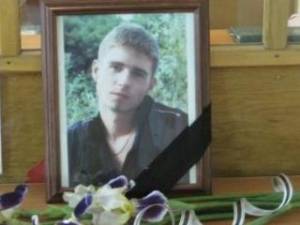Further investigation into Ihor Indylo’s death ordered … again

The Desnyansky District Court in Kyiv has once again ordered that the criminal case into the death of Ihor Indylo, the young student who died in police custody in the early hours of 18 May 2010 be passed to the Prosecutor’s Office for further investigation.
Oleksandr Zarutsky, the lawyer representing Ihor Indylo’s parents, told journalists that the ruling had been passed on Friday at a preliminary hearing. He said that the court had found that the criminal investigation had not established a number of circumstances nor had it rectified infringements, including those indicated by the court of appeal.
The Desnyansky District Court has already passed such rulings at least twice before, the last time being on 29 October 2012.
The Prosecutor’s Office consistently appeals against these rulings claiming that all investigative measures have been taken. The Kyiv Court of Appeal on 25 January 2013 allowed this appeal, and it is difficult to believe that this whole procedure will not be repeated.
The following has in one way or another been repeated many times. The obvious reluctance to investigate the death of a healthy young student in police custody and continued efforts by the Prosecutor’s Office to block a proper investigation leave no choice.
Ihor Indylo should have celebrated his 20th birthday on 18 May 2010. He had begun celebrating it in advance since a friend couldn’t stay until the next day. He was detained just after 8 in the evening. The police have maintained that he was seriously drunk and picking a fight with the hostel guard. The video footage of the two young men entering the police station at 20.38 does not indicate any serious degree of inebriation.
He was interrogated and that at 20.52 an ambulance was called since he was unconscious in the interview room. The police staff did not explain to the ambulance crew why he was unconscious. The doctor who arrived said that Ihor did not react to anything until they touched his head when, they say, he began aggressively trying to defend himself.
When Ihor came to, the ambulance crew left the station without properly examining him. The CCTV footage shows that at 21.49 police officers dragged Ihor to the cell and left him on the floor. Despite his extremely chaotic movements he was left until 4.51 when he was found dead.
The police officers informed Ihor’s parents of his death, asking them to collect his body. His parents were told that he had choked however they could see the multiple bruises on their son’s body.
The officers claimed that he had fallen from a bunk in the cell in a drunken state. The bunk is 50 cm above the floor.
The criminal investigation into Ihor’s death was initiated on 28 May 2010.
In December 2011, Serhiy Kovalenko was amnestied. He had been charged with “professional negligence without grave consequences” for not checking the grounds for detaining Ihor Indylo..
On 5 January 2012 Serhiy Prykhodko received a five year suspended sentence for “exceeding official powers accompanied by actions denigrating the personal dignity of the victim”.
The following is the list of questions put together by NGOs. They still remain unanswered.
What caused Ihor to lose consciousness in the interview room?
If Ihor fell on his right side in the interview room, as stated in the testimony of Prykhodko and O. Khomenko (the young man with Ihor – translator), where are the bruises on his left side from?
What really happened in the interview room?
If Ihor was in a state of extreme inebriation, as the police and doctor assert, why was he not hospitalized?
Why was he not given adequate medical assistance in the police station? Why wasn’t an ambulance called a second time, including when he was in the cell since the video shows that he was in a bad state?
Why were all the events of that night not re-enacted bearing in mind the full video recording? It is important to view and analyze absolutely all recordings since this will help to establish the evens and also demonstrate discrepancies and contradictions in the testimony of witnesses and suspects, as well as their inability to provide answers to certain questions. It is clear, for example, from the video that doctors arrived at the police station at around 3 a.m. yet they did not come in to see Ihor. The police officers were unable to explain at the court hearings who these doctors were, who had called them and why.
Why did Ihor’s condition change so sharply for the worse when he was placed in the cell? According to the police officers, Ihor was in a state of extreme inebriation. Despite this he freely walked through the turnstile into the police station with his hands in his pockets. Yet in the cell his arms were moving about chaotically.
A large number of questions are elicited by the forensic examination. Why is their no x-ray of the injuries to Ihor’s scalp, and only written notes by the doctor; why was the direction of the fracture not investigated? This would help explain how he received the injuries.
Why did neither the examination nor the criminal investigation explain where the blood in Ihor’s stomach came from?
Why in the medical doctors is what the doctors did not in fact see recorded, as well as readings that the doctors did not take? For example, the examination protocol of the body is signed by the ambulance doctor, yet from the video footage it is clear that he didn’t even go near Ihor’s body.
How do you explain the numerous contradictions and discrepancies in the testimony of Oleksandr Khomenko, Ihor’s friend who was with him in the police station that night? Oleksandr even said himself during the hearing “I don’t know which of my witness statements that court should believe”, and that is recorded in the protocol.





